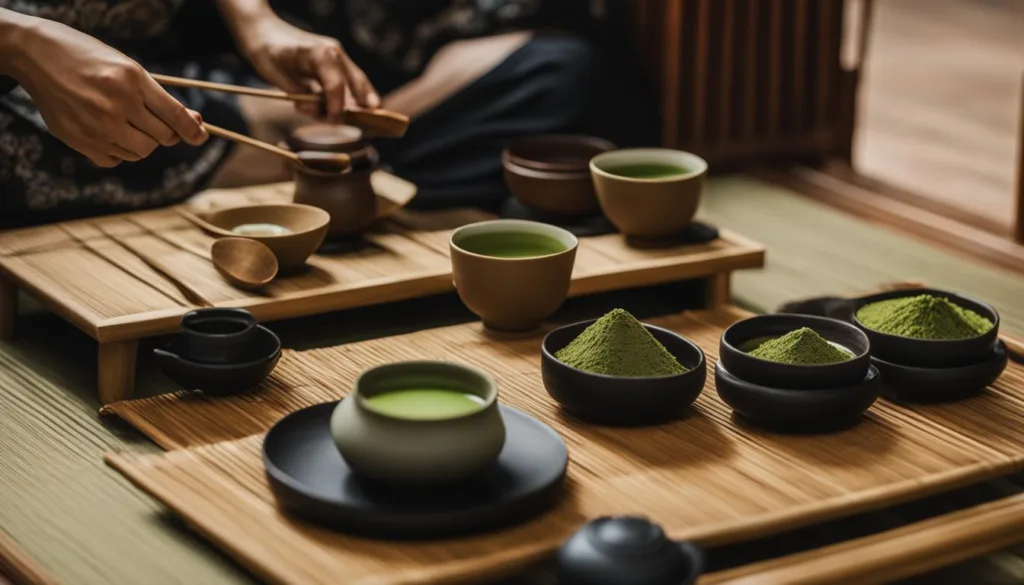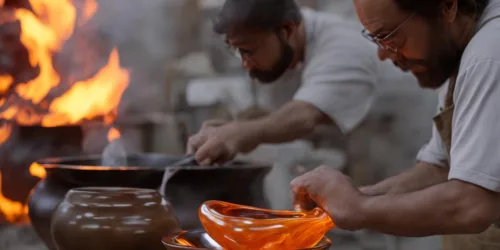Experience Serenity with Tea Ceremony Meditation
Welcome to our article on tea ceremony meditation, a practice that brings together the calming ritual of tea preparation and the mindfulness of the present moment. Originating in Asia thousands of years ago, tea ceremony meditation has gained popularity for its ability to create a sense of serenity and inner peace.
At Navutu Dreams, we invite you to embark on a journey of tranquility through the ancient tradition of tea ceremony meditation. Discover the art of mindfulness with tea and immerse yourself in a practice that has been cherished by cultures such as China, Japan, and Taiwan for centuries.
Join us as we explore the beauty and benefits of tea ceremony meditation, and learn how to incorporate this practice into your own life to achieve a state of peace and balance.
Key Takeaways:
- Tea ceremony meditation combines the ritualized preparation and drinking of tea with mindfulness.
- It is a 3,000-year-old tradition practiced in Asia, particularly in China, Japan, and Taiwan.
- The tea ceremony emphasizes living in the present moment and cultivating respect for oneself and others.
- Tea ceremony meditation promotes relaxation, mindfulness, and inner peace.
- By incorporating tea ceremony meditation into your life, you can experience the transformative power of this ancient practice.
The Art of Tea Ceremony
The tea ceremony is a ritualized process of making tea that originated in East Asia, particularly in China, Korea, and Japan. It is influenced by Zen Buddhism and emphasizes harmony, humility, self-transformation, and spiritual awakening. The key to a tea ceremony is to make the preparation of tea a ceremonial experience, using specific tools and vessels.
The ceremony involves several steps, from purifying the elements to serving the tea to the guests.
- 1. Purifying: The tea ceremony begins with purifying the elements and creating a clean and sacred space. This involves cleansing the teapot, teacups, and utensils, as well as preparing the tea room to ensure a tranquil environment.
- 2. Heating Water: The water used for making tea needs to be heated to the appropriate temperature. The temperature can vary depending on the type of tea being prepared.
- 3. Measuring and Brewing: The tea leaves are carefully measured and placed in a teapot. Hot water is then poured over the leaves, allowing them to steep for a specific amount of time to extract the flavors and aromas.
- 4. Serving: The tea is served to the guests in a specific order, starting with the oldest or most prestigious guest. The host presents the teacup to each guest, who receives it with both hands as a sign of respect.
The tea ceremony is not simply about making and drinking tea; it is a deeply symbolic and meditative practice. The entire process is infused with mindfulness and intention, creating a serene and reflective atmosphere. Through the art of tea ceremony, individuals can cultivate a deeper connection with themselves, others, and the present moment.
The tea ceremony is a manifestation of purity and simplicity. It is an act of grace and gratitude, a way to connect with the divine and find inner peace.”
– Tea Master Soshitsu Sen XV
The Benefits of Tea Ceremony Meditation
Tea ceremony meditation offers numerous benefits for practitioners. It serves as a self-care practice that promotes relaxation, mindfulness, and inner peace. The ritualistic nature of the ceremony helps individuals slow down, be present in the moment, and focus on the now. It also provides a space for reflection and offers stress-reducing benefits.
“Tea is more than just a beverage; it is a way to connect with ourselves and find tranquility in the chaos of everyday life.”
– Tea Master Chen Wei
The zen tea ceremony allows us to escape the distractions of the external world and create a sacred space within ourselves. By engaging in this mindful practice, we cultivate a sense of calmness and presence.
The Healing Power of Tea Ceremony
The tea ceremony has long been revered for its therapeutic and healing properties. Its meditative qualities promote relaxation, reduce anxiety, and enhance mindfulness. By focusing on each step of the tea preparation process, we engage our senses and become fully absorbed in the present moment.
Moreover, the act of serving tea to others fosters a sense of connection and community. It encourages empathy, compassion, and deepens our understanding of ourselves and those around us.
The Physical and Mental Benefits
Practicing the tea ceremony on a regular basis can have a positive impact on both physical and mental well-being. Some of the key benefits include:
- Stress reduction
- Improved focus and concentration
- Enhanced creativity
- Promotion of clarity and alertness
- Boosted immune system
- Increased self-awareness
- Heightened sense of gratitude
- Improved digestion and metabolism
Tea Ceremony Meditation in Practice
Whether you choose to practice the tea ceremony individually or in a group setting, the benefits remain the same. It is a practice that transcends cultural boundaries and provides a sanctuary for self-reflection and personal growth.
Creating a dedicated space for your tea ceremony can further enhance the experience. Set up a simple altar with a tea set, incense, and a serene image to create a peaceful ambience.
As you engage in the zen tea ceremony, embrace the moment, savor each sip of tea, and allow your senses to awaken. Let go of distractions and immerse yourself in the tranquility of the present moment.
Join us at Navutu Dreams and experience the transformative power of tea ceremony meditation. Rediscover inner peace, cultivate mindfulness, and embark on a journey of serenity and self-discovery.
| Benefits of Tea Ceremony Meditation | Description |
|---|---|
| Relaxation and stress reduction | Engaging in the tea ceremony promotes relaxation and reduces stress, providing a much-needed break from the demands of daily life. |
| Mindfulness and presence | The ritualistic nature of the tea ceremony encourages us to be fully present in the moment, enhancing mindfulness and awareness. |
| Connection and community | Serving tea to others fosters a sense of connection and community, promoting empathy, understanding, and compassion. |
| Physical and mental well-being | The tea ceremony offers a range of benefits, including stress reduction, improved focus, heightened creativity, and a boost to the immune system. |
| Self-reflection and personal growth | Engaging in the tea ceremony provides a space for self-reflection and personal growth, facilitating clarity, self-awareness, and gratitude. |

Conclusion
Experience the transformative power of tea ceremony meditation, where mindfulness, respect, and the art of tea preparation converge. This ancient practice takes you on a serene journey to find inner peace and balance, all while savoring a cup of tea.
Whether you choose to practice the meditative tea ceremony individually or in a group, it provides a unique opportunity to connect with yourself and the present moment. By slowing down and immersing yourself in the ritualistic process, you can cultivate a sense of tranquility and mindfulness.
Embrace the centuries-old tradition of tea ceremony meditation and discover the profound benefits it offers. This practice is not just about drinking tea; it is a powerful tool for self-care, relaxation, and stress reduction. Allow yourself to be fully present, let go of distractions, and experience the serenity that comes with embracing the art of tea ceremony meditation.
FAQ
What is tea ceremony meditation?
Tea ceremony meditation is a 3,000-year-old tradition practiced in Asia, particularly in China, Japan, and Taiwan. It involves the ritualized preparation and drinking of tea, creating a bond between mindfulness, respect, and living in the present moment.
Where did the tea ceremony originate?
The tea ceremony is a ritualized process of making tea that originated in East Asia, particularly in China, Korea, and Japan. It is influenced by Zen Buddhism and emphasizes harmony, humility, self-transformation, and spiritual awakening.
What are the benefits of tea ceremony meditation?
Tea ceremony meditation offers numerous benefits for practitioners. It serves as a self-care practice that promotes relaxation, mindfulness, and inner peace. The ritualistic nature of the ceremony helps individuals slow down, be present in the moment, and focus on the now. It also provides a space for reflection and offers stress-reducing benefits.
Can tea ceremony meditation be practiced alone?
Yes, tea ceremony meditation can be practiced individually or in a group. Whether it’s a solitary practice or a shared experience, the tea ceremony fosters a sense of calmness and connection.
What can I expect from a tea ceremony meditation session?
During a tea ceremony meditation, you can expect a tranquil journey to inner peace and balance. It allows you to find serenity and tranquility while enjoying a cup of tea. The experience provides an opportunity to connect with oneself and the present moment.






